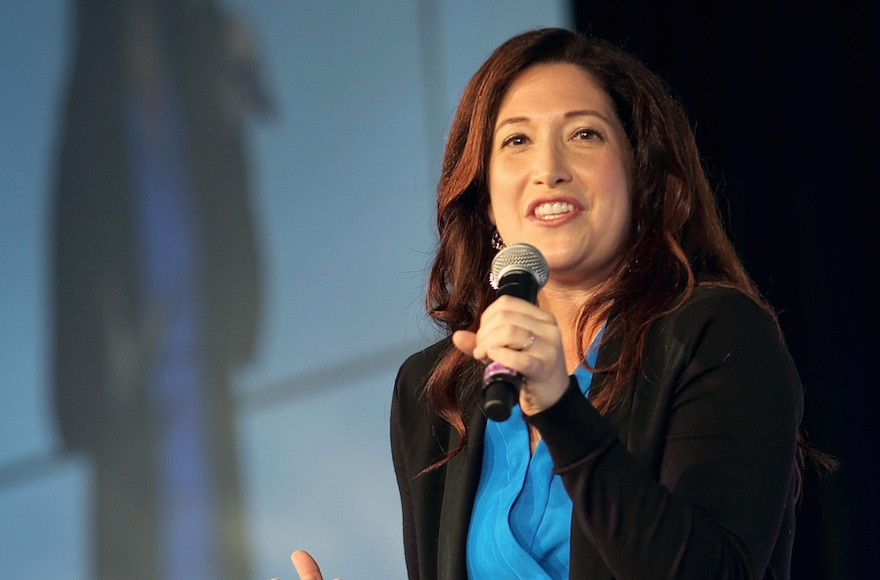Mark Zuckerberg’s sister responds to his Holocaust comments
Published July 20, 2018

Randi Zuckerberg speaks at the closing plenary of the annual Jewish Funders Network conference in La Jolla, Calif., April 5, 2016. (JTA file photo)
(JTA) — Randi Zuckerberg, sister of Facebook co-founder Mark Zuckerberg, weighed in on his controversial comments about Holocaust deniers on the social media platform.
In a statement provided to CNN, Randi Zuckerberg, who previously served as director of marketing for Facebook and is the founder and CEO of Zuckerberg Media, denounced Holocaust deniers, citing “their hateful, disgusting rhetoric.”
She appeared to agree with her brother, however, adding that banning such people from social media “will not make them go away.”
Her comments came after her brother told Recode’s Kara Swisher that Facebook would not remove the posts of Holocaust deniers because they could include people who “aren’t intentionally getting it wrong.” He said Facebook would only make sure such posts would not get high visibility.
Critics, including the Anti-Defamation League, said a private company should draw the line at tolerating obvious falsehoods and hateful, unfounded conspiracy theories.
In her remarks to CNN, Randi Zuckerberg noted her longtime involvement in numerous Jewish organizations.
“As a leader in the Jewish community, and someone who has worked at the ground floor of social media, I felt a responsibility to weigh in,” she wrote.
She mentioned her involvement in Birthright Israel, PJ Library, Reboot, the Wexner Foundation, the Shalom Hartman Institute, San Francisco’s Contemporary Jewish Museum and “JCCs and Federations across the U.S. and Canada.”
Zuckerberg said her brother “could have chosen his words apparently.” She said, however, the difficulty of “navigating this incredibly difficult new world where the notion of free speech is constantly changing.” Citing the positive effect that Facebook has had on the Jewish community, she lamented that the platform has become a tool for detractors as well.
“Unfortunately, when we give a voice to everyone, we give it to people who use that voice for good and to people who abuse that voice,” she wrote. “Organizations doing impactful work now have more powerful tools than ever before, yet the nasty dark underbelly that exists right beneath the surface has access to those exact same tools.”
She suggested that a national debate was needed on Holocaust deniers’ right to a platform.
“As much as I disagree with Holocaust deniers having a voice at all, the reality is that it is not currently considered a crime in the United States, and if we want our social networks to remove this hateful speech and follow the lead of many countries in Europe who denounce it as criminal, we need to expand the conversation more broadly and legislate at a national level,” she wrote.
“I wish that these platforms didn’t give a voice to those who cry out for divestment from Israel, make anti-Jewish remarks, and many of the other issues affecting our community today. But silencing everyone — or worse, silencing selectively — would be far more nefarious.”













